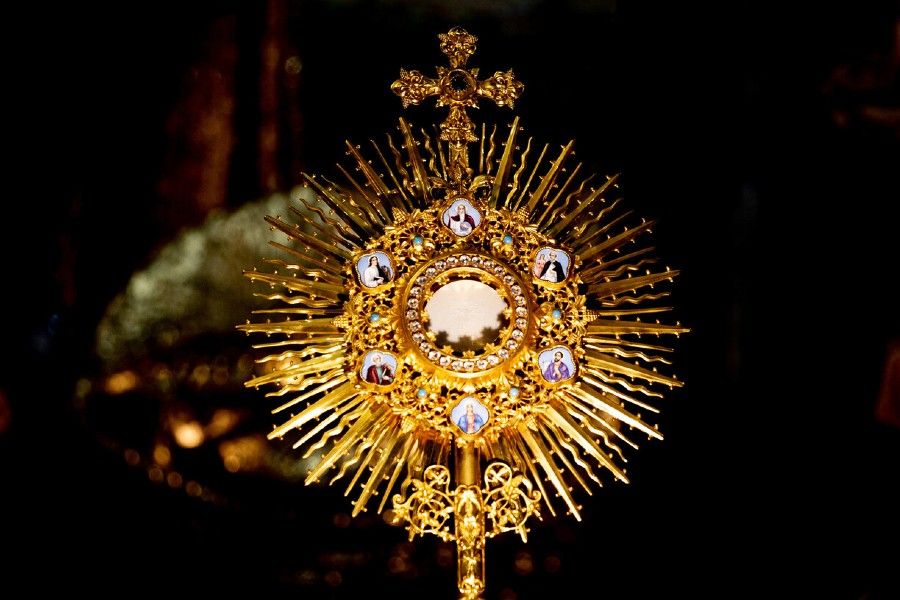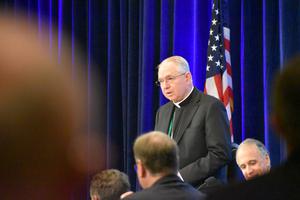Boston Auxiliary Bishop Reveals Why He Voted Against Eucharistic Document
Bishop O’Connell said he wished to refocus the conversation away from “who should be denied” the Eucharist, and toward “who should receive” the Eucharist.

BOSTON — An auxiliary bishop of the Boston archdiocese on Sunday revealed why he voted against a motion of the U.S. bishops’ conference to begin drafting a teaching document on the Eucharist.
Bishop Mark O’Connell, an auxiliary bishop of Boston, said in a July 25 statement that he believed the Eucharistic document would lead to greater polarization. Bishop O’Connell published his statement in the bulletin of St. Theresa parish in North Reading, Massachusetts, as a response to a parishioner’s question about denying Communion to pro-abortion politicians.
During the U.S. bishops’ virtual spring meeting in June, they debated a proposal to begin drafting a teaching document on the Eucharist. The proposed document outline covered the Church’s Eucharistic teaching on a number of points, including the need for Catholics to live out the Church’s teaching in public before and after receiving Communion.
Some bishops critical of the proposal said it would be interpreted as a call to deny Communion to specific pro-abortion politicians, and would thus result in greater political polarization.
“I fear the whole process of writing the document will lead to more and more opportunity for some bishops and writers to further polarize our people,” Bishop O’Connell wrote. He said “it is not up to me (or you)” to deny anyone Holy Communion, adding that the decision rests with each individual bishop.
In written responses to CNA’s questions after the publication of his letter, Bishop O’Connell said he sees the discussion of denial of Holy Communion to certain public figures as focusing too heavily on abortion, to the detriment of other issues.
The topic has been hotly debated in some quarters with the election of Joe Biden, a Catholic who supports abortion and attends Mass regularly, to the presidency.
The June vote among the bishops on the Eucharistic document was conducted by secret ballot. The final results of the vote on whether to begin drafting the document, a motion which required only a simple majority to pass, was 168 bishops in favor, 55 opposed, and 6 abstentions.
During the virtual meeting, several dozen bishops spoke explicitly for or against the proposal, but Bishop O’Connell is one of the few bishops to publicly reveal and explain his vote following the results.
Bishop O’Connell acknowledged that although President Biden attends Mass regularly, some of his policy positions are at odds with Church teaching - most notably his support for taxpayer-funded abortion.
However, he said, “I do not think a letter about the Eucharist is the correct place to address this issue.”
He noted that “there are more appropriate ways, and they are delineated in Canon Law.” He did not, in his letter, elaborate on what those more “appropriate ways” are.
Bishop O’Connell told CNA he had in mind a bishop’s canonical authority to determine the pastoral response in his particular diocese.
In his letter, Bishop O’Connell laid out several reasons why he voted against drafting the document in June. He said he believed the discussion ought to have taken place in person rather than during a virtual meeting.
Bishop O’Connell elaborated to CNA that he did not feel comfortable expressing his concerns during the virtual meeting, and that he felt the discussion that took place was not adequate.
While some bishops had moved to change the parliamentary rules of the meeting to allow for unlimited debate time on the motion of the Eucharistic document, that effort failed in a vote on Wednesday. Nevertheless, while debating the motion to draft the Eucharistic document, bishops were allowed to speak in their normal five-minute time slots long after the conference meeting was scheduled to wrap up on July 17.
“If we need to speak with each other about how individual bishops should approach public figures in their dioceses we should do that directly and in person and over time - not just make some vague reference to it in a document on the Eucharist,” Bishop O’Connell told CNA.
“To me, putting this into the document distracts from anything else in the document and is a roundabout way of not having a serious discussion on this critical issue,” he said.
A proposed outline of the Eucharistic document, made available to bishops in advance of the spring meeting, made no mention of public figures and Communion. However, the conference’s doctrine committee - charged with drafting the document - included a letter with the proposed outline, saying the document would include a “special call for those Catholics who are cultural, parochial, or political leaders to witness to the faith.”
Bishop O’Connell wrote in his letter that he has “no faith that the document finally produced would be read except for the section on Eucharistic Consistency and then, as with most things, through the lens of the politics of the media on either side of the question.”
The bishop did not lay out his own opinion of whether or not Biden should be admitted to Holy Communion, instead noting that “Canon Law leaves it to his individual bishop and pastor to speak with him and that is a private conversation.”
Bishop O’Connell said he wished to refocus the conversation away from “who should be denied” the Eucharist, and toward “who should receive” the Eucharist.
“As a priest and a bishop giving Holy Communion, I accept the humble ‘Amen’ of our Catholics as they approach the Altar and I leave judgement on specific individuals to the private conversations with their pastors,” he concluded.
The Catholic Church teaches that the Eucharist is truly the Body and Blood of Christ, and as such must be received worthily.
Canon 915 of the Code of Canon Law states that those “who obstinately persist in manifest grave sin are not to be admitted to Holy Communion.”
The Catholic Church has always taught that abortion is a grave sin. In a 2004 memo to then-Cardinal Theodore McCarrick, Cardinal Joseph Ratzinger said that a politician consistently campaigning for and voting for permissive abortion laws constitutes formal cooperation with evil. Biden has publicly advocated for protection of abortion in law, including the codification of Roe v. Wade, the 1973 Supreme Court decision which mandated permissive abortion laws nationwide.
The next canon, 916, exhorts the individual receiving Communion to be aware of his own worthiness, and to go to confession if conscious of grave sin.
“I think we should further explore that Canon which applies to everyone including the President and take it out of politics,” Bishop O’Connell told CNA.
“We are all unworthy to receive, let that unworthiness be the source of our unity,” he said.
Other bishops, such as canon lawyer Bishop Thomas Paprocki of Springfield, have also emphasized the importance of personal discernment and examination of conscience on the part of all Catholics before they approach Holy Communion.
“If they are conscious of grave sin, they shouldn't go to communion,” Bishop Paprocki told CNA in March.
He noted that this is true not only for politicians, but for all Catholics. However, he added, a failure to consistently apply Canon 915 - that those persisting in “manifest grave sin” ought not be allowed Communion - causes confusion. It “gives rise to scandal, in that it leads to the impression that grave sins may not be so grave after all if there are no consequences for committing them,” he said.
CNA asked Bishop O’Connell about the possibility of scandal in cases where a pro-abortion Catholic politician continually presents himself for Holy Communion, despite having been admonished by his bishop or pastor not to do so without first recanting his support for abortion.
“Calling abortion ‘the’ preeminent issue instead of ‘a’ preeminent issue, allows other issues to go too far down the ladder - such as immigration, euthanasia, the rights of workers, priority for the poor, racism, torture,” O’Connell responded to CNA. The U.S. bishops’ conference has referred to abortion as a “preeminent priority,” due to the scale of abortions per year, the gravity of the evil and the effect of abortion on women and families.
“We need to preach the Magisterium to our people in its fullness and not be confined to one issue while acknowledging that abortion is indeed a key issue and a grave evil. There are politicians in both parties acting scandalously on many issues, but some look the other way because of their political alignment,” Bishop O’Connell said.
The U.S. bishops’ doctrine committee will now lead the process of drafting the document, with input from other conference committees. A draft of the document could be ready to be debated, amended, and voted on by the bishops at their November meeting - which is currently planned to be held in-person in Baltimore, Maryland.
In November 2020, Cardinal Wilton Gregory of Washington, D.C. told a reporter that he would not deny pro-abortion politicians Holy Communion if they were to present themselves for the sacrament at Mass. The new bishop of Biden’s home diocese of Wilmington has not yet publicly spoken on this issue.
- Keywords:
- eucharistic document
- bishop mark o'connell
















